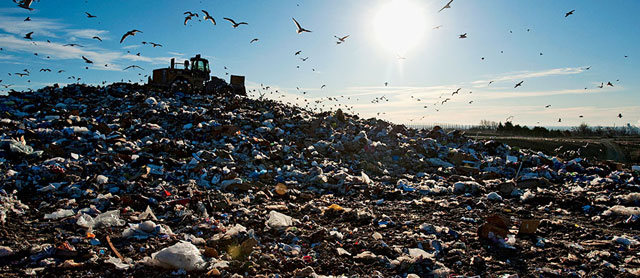We used to put our trash can at the curb for pickup once a week, but I noticed a few years ago that with the increase in the number of items that could be recycled, we could put it out less often. In 2016, we put the trash can out for pickup just seven times and my goal for 2017 is to reduce our trash pickups to five or maybe even four times! How do we do it? We follow the 3 R’s (and 2 C’s): Reduce, Reuse, Recycle, Compost & Compact.
Reduce
First, we reduce by being very intentional about what we bring into our household. We think through whether we really need to bring home something, new or used, and we try not to pick up too many things that later become yard sale items for us.
Reuse
Next, we reuse by trying to find new homes for anything we no longer need. We have been pleasantly surprised by what people have taken for free. Twice we posted ¼" plywood sheets that we pulled off walls in two different rooms on Craigslist and people picked them up. One person took them for a rabbit cage. In recent months, we had people take a medicine cabinet that had a broken trifold door, storm door windows and screens, a glass pane with uneven edges, a plexiglas fish tank with cracks, white paper lunch bags, 1960's era metal kitchen cabinets, a mailbox with some dents, and carpet remnants. Many communities also have Freecycle groups where you can post items for free on their web site. It's also a great way to get items that you could use for free. Like they say, one man's trash is another man's treasure and you are keeping many items out of landfills. We also increased reuse in the last couple of years, by switching from paper to cloth napkins and by using reusable bags for grocery shopping. We donate used clothing unless it's too torn up for anyone else, in which case we reuse it for rags.
Recycle
The third step is recycling everything we can. All paper and cardboard is recycled including paper towel and toilet paper cores, cereal boxes, junk mail, advertising circulars, envelopes, scrap pieces of paper, everything paper and cardboard. We recycle all plastics with the recycling symbol on them as well as all glass and metal containers. We typically fill a paper grocery bag of paper recycling every four weeks and we set out our two 15 gallon bins for other items every other week.
Compost
Yard waste does not go in the trash. We put leaves and weeds in our garden area for compost. I often put hedge clippings under and behind the bushes to decompose. A friend used his gas-powered chipper to grind up an accumulation of dead sticks from our tree a couple of years ago. I plan to buy an electric chipper this year to start grinding up our sticks and leaves. Food garbage currently goes in the garbage disposal, but I'm going to look at some composting options.
Compact
To further minimize our pickups, we compact the trash. I step down with my foot on the items in our main trash can in the kitchen every day. To finish the compacting process, I step INTO the 35-gallon trash can outside our back door to use my weight to further compact everything in it. I figure that the time I spend compacting the trash comes close to balancing the time that I save from hauling the trash can out to the curb and back several fewer times during the year. Without such compacting, we would put the trash out a few more times each year, but still far less often than most households.
What about you?
So, if my family can greatly reduce our trash pickups, I think you can too. Think of the money that can be saved from municipalities scheduling fewer weekly trash pickups or how waste haulers could lengthen their routes each day since they would be passing by more households that do not have trash out for pickup. Furthermore, think of the vast reduction in landfill space. If you are someone is concerned about the environment, then here is your chance to do something meaningful about it. We can all benefit from putting in a little extra effort to reduce our waste and help our planet.
By Mark King